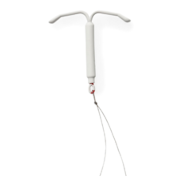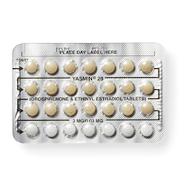I chose sterilization, and I’ve never looked back
Why sterilization gave me a sense of peace that no other method has

In spring of last year, I finally got it: a referral to a surgeon to discuss my sterilization.
I prepared my plea ahead of time: I’ve always been sure I don’t want to go through pregnancy and bear a child; if we change our minds, my fiancée (now wife) can have kids biologically; I have a bunch of kids in my life that I help care for already; and this would be gender-validating surgery for me.
Yeah, gender-validating surgery. Somewhere along this journey, I discovered something about myself: I’m nonbinary trans, specifically agender, which means I don’t feel an internal sense of gender. And my aversion to the idea of pregnancy was heavily tied up in not being a woman. While I don’t normally experience much body dysphoria, I knew pregnancy would trigger it in me.
I could have saved my breath. She laughed and told me she didn’t need to hear my reasons, as long as I understood that it wasn’t reversible. We discussed my options. I could choose between having my fallopian tubes clamped shut, which relies on the build-up of scar tissue to prevent pregnancy, or to have them removed altogether. After years with a plastic object inside my uterus, I wasn’t keen on the first option. And when I heard that the second approach is virtually 100% effective immediately, and that it would reduce my risk of ovarian cancer, I was sold—I’d be having a laparoscopic bilateral tubal salpingectomy. I signed the waivers right away and waited the 30 days that Medicaid requires.
My journey: first the pill, then the IUD
Pregnancy and childbirth have always sounded awful to me, so I did my best to prevent them. I started taking the pill when I was 14 and stayed on it through my first couple of years in college. There weren’t a lot of options at the time—most medical providers weren’t giving IUDs to uterus-owners who didn’t already have kids—so the pill it was, despite it being a terrible option for a forgetful, distracted teenager like me. Taking a medication every day? Looking back, it’s a miracle I never got pregnant.
At 18, I got married to a soldier in the US Army. It’s common to have kids early when you’re a military wife, but I was childless and meant to remain that way. After expressing delighted surprise that I, the wife of a lower enlisted man, did not have kids nor did I intend to, my army hospital medical providers readily agreed to insert a Paragard IUD in my uterus. By this point, I had been refused by several civilian doctors, so I was thrilled to have such an easy-to-use, low-maintenance, and long-lasting method of birth control. While the insertion hurt, and in the following months my periods got heavier and I experienced menstrual cramps for the first time in my life, I considered the gain well worth the pain.
A few years later, my uterus began to expel that IUD. I knew something was wrong, because I could feel the IUD all of the time. I went to a gynecologist, and they removed it immediately and sent me home.
I was eager to get another IUD, but this time I opted for a hormonal one in hopes it would make my periods easier. It was a tough call: I desperately needed less pain in my life since I was already suffering from chronic pain, but I had gone off hormones for a good reason. I have complex post-traumatic stress disorder (CPTSD) that manifests strongly as depression and anxiety, and the hormones in the birth control I had used in the past had affected my mood and sex drive. Ultimately, I decided it was worth it to roll the dice on getting a hormonal IUD.
While I was relieved to have an IUD back in, I was always stressed about that tiny sliver of a chance that I would conceive, and I always resented the stress, the time, the money, the labor, and the pain that I had to put in to simply avoid something.
I knew I wanted a permanent solution so that I would never have to worry about pregnancy again. I had never held back about my desire not to have kids, but I started pushing the issue with my medical providers. A Planned Parenthood provider I saw told me she’d rather avoid surgery, since IUDs worked for me. Except one had already failed.
And then, after a few years, something felt…off with my IUD. I went back to Planned Parenthood, and they looked, but they didn’t see anything wrong. I insisted. I know my body, I told them, there’s something wrong. I told them I wanted it out, regardless of what they did or didn’t see. So they set me up to take it out: gown, stirrups, speculum.
The IUD didn’t want to come out, though—it took three separate yanks between two providers to get it to finally come out, and for a brief moment, I honestly thought I was going to end up in the ER. After my traumatizing experience with my second IUD removal, I asked to be sterilized yet again. This time though, they said yes quicker than a doctor has ever agreed to anything for me, and they put in my referral the same day to the major hospital in my area.
Finally, the surgery
Two months after my IUD removal, I walked into pre-op with my nesting partner (the partner I live with) as support.
Here’s what they did: instead of opening me up and leaving me with a scar across my abdomen, they did my procedure laparoscopically. That means they made three tiny incisions, one through my belly button and one on either side, and went in with tiny cameras and surgical tools. They then removed my fallopian tubes.
The surgery itself took 34 minutes from start to finish. Medicaid charged me $3 for the surgery, and $6 or $7 for the painkillers after.
I’ve never looked back
Since then, I have taken every single opportunity since to lift my shirt up slightly, point to the tiny white scars, and exclaim with glee, “I’m fixed!” People find it funny, but it’s true: I do feel fixed.
Everything prior—the pill, IUDs—was temporary, a band-aid. The possibility of it failing was always in the back of my mind, making it a little harder to enjoy myself whenever I had sex.
I feel comfortable in my body now. Or at least, more comfortable than I did. Removing my fallopian tubes has actually made me feel more complete, more whole, than ever before.
How do you feel about this article?

Heat up your weekends with our best sex tips and so much more.


